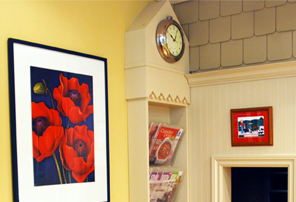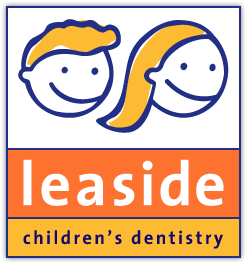New Patients
Our office welcomes new patients of all ages (from birth to teenagers) and abilities. We are committed to providing your child with a positive first dental visit at Leaside Children's Dentistry


Your baby's first dental exam
“First visit by first birthday” is a good rule of thumb. Treat the first dental visit as you would a well-baby checkup with the child’s physician. By their first birthday, babies typically have a few teeth, which should be checked for any sign of decay. Through routine examinations, the dentist will also notice if primary teeth that should be appearing are not present, and will take corrective action if necessary. Beginning your baby's dental examinations early starts building a caring and co-operative relationship between your dentist and your child.
What to expect at the dental visit
Please be as natural and relaxed as possible when telling your child about the dental appointment – generally the less fuss the better. Let your child know that they will meet some new people who want to help their teeth stay healthy. Focus on the positive. Mention that this office is for children only and that the dentist and their staff will explain all procedures and answer any questions.
On your first child’s visit, you'll be asked to complete both a medical and personal questionnaire so we can become better acquainted with your child. Dr. Ing will examine your child’s teeth and mouth and assess your child's dental needs. She’ll review the findings with you and discuss plans for any additional visits.
We recognize that all kids are different. Some children may be ready to have their teeth cleaned at their first visit; others may only feel comfortable having their teeth examined. For older children x-rays may be recommended to detect cavities or assess dental development. Our goal at the first visit is to expose your child to a warm and positive atmosphere, while at the same time providing you with a comprehensive review of their oral/dental health. This is also a good opportunity to answer any questions that you may have and to go over tips for effective home care.
Please avoid negative words or phrases that may frighten your child. Instead of 'needle,' 'shot,' and 'drilling,' we suggest 'a little pinch,' 'sleepy water for your tooth,' and 'tooth tickler,' as these terms are much better understood and accepted by children. Our office makes a practice of using words that convey the same message, but are pleasant and non-frightening to your child. We are happy to discuss and help you with appropriate language.
A full stomach increases the possibility of discomfort and nausea, especially if your child is anxious. Please keep eating to a minimum just before the appointment.
If your child has a favourite toy, book or video, please feel welcome to bring it to the appointment.
We invite you to stay with your child during the initial examination. During future appointments, we suggest you allow your child to accompany our staff through the dental process. We can usually establish a closer rapport with your child when you are not present. Our purpose is to gain your child's confidence and overcome apprehension. For the safety and privacy of all patients, other children who are not being treated should remain in the reception room with a supervising adult.
During Treatment
Some children squirm and may become difficult to control during the dental visit. Please do not be surprised or embarrassed if your child does not fully co-operate at first. This behaviour is not unusual in a dental office and we are experienced in dealing with a variety of behaviours.
We may request that you leave the operatory but don't feel that you are abandoning your child. Some children react well when a parent is present, while others behave much better when the parent is out of sight.

